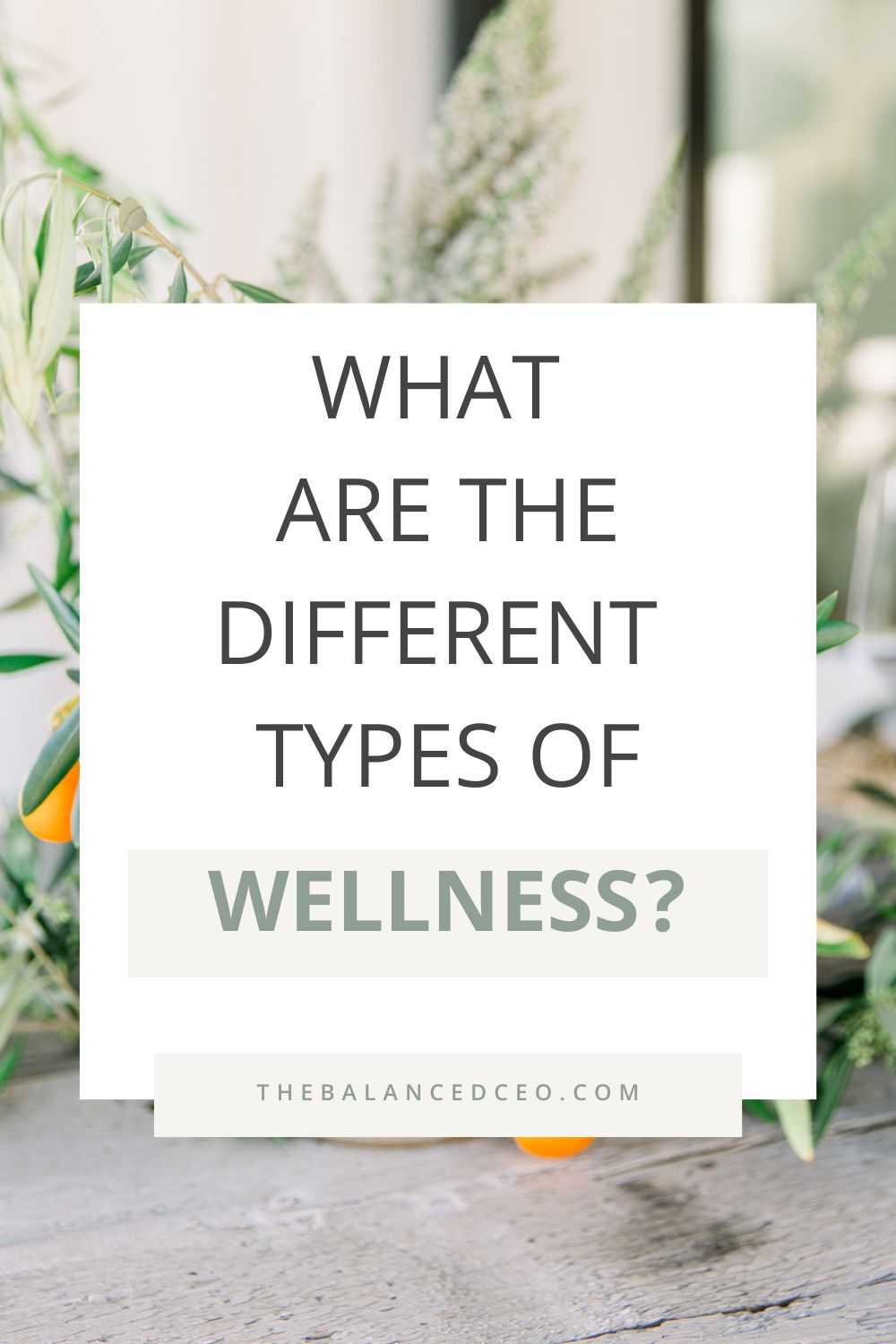This post may contain affiliate links, which means I’ll receive a commission if you purchase through my links, at no extra cost to you. Please read full disclosure for more information.

Wellness refers to your overall physical and mental state. Maintaining your wellness is a balancing act between different dimensions or types of wellness. If you’re unwell in one area of wellness, it can affect all other areas of your life.
So, it’s important to know about different types of wellness and how you can positively impact each of them. We call this kind of whole-body awareness “holistic health.” Here are five different types of wellness and how they affect your whole body.
1. Physical Wellness
Having physical wellness means you are taking the steps to care for and strengthen your body. A large part of maintaining good physical wellness is listening to your body. If you feel sick or feel pain, you should take appropriate measures to address it instead of ignoring it and staying in a suboptimal state.
Ways to keep physically well include moving more, working to eliminate unhealthy habits, like smoking and overeating, and getting an appropriate (for your age) amount of sleep every night.
If you’re starting to exercise for the first time, be sure to start slow and consult a physician before beginning a program. Exercising for 30 minutes, five days a week can provide great health benefits.
Another crucial part of maintaining physical wellness is eating a balanced diet. Whole foods, proteins, fruits, vegetables, and water are important parts of staying hydrated and getting the nutrients your body needs to function properly. Achieving a healthy diet is possible through various approaches. For instance, some people choose to follow a low-carb or keto diet. This requires reducing carbohydrate intake and increasing intake of healthy fats and proteins.
Rest is a very important part of your health, as your body uses the time to recover both physically and mentally from the day. Adults need an average of seven to nine hours of sleep a night. Consistently getting less sleep than needed can have detrimental effects on your physical wellness.
When you lack physical wellness – whether you’re missing sleep or lacking nutrients in your diet – it can be detrimental to your mental and emotional state, as well.
2. Emotional Wellness
Emotional wellness, also referred to as mental wellness, is your ability to handle the stressful parts of life as well as your ability to adapt to change.
Learning to cope with stress is key to having emotional wellness. Emotionally well people are resilient people who are equipped to handle life’s expected and unexpected challenges.
As with physical wellness, sleep is an important part of emotional wellness. When you’re tired, your mind doesn’t react as quickly as it does when fully rested. You are less likely to think clearly when you are fatigued, and that can make you emotionally vulnerable.
Social connections are another important tool in emotional wellness. Research has found that the quality of our relationships with others can directly impact our emotional health. Healthy relationships also provide a support system for emotionally taxing times.
Another way to maintain emotional wellness is to practice mindfulness. Mindfulness is about being completely focused on the moment and setting the stresses of the past and future aside. Mindfulness helps you focus on one situation at a time and find peace in moments away from life’s chaos.
3. Social Wellness
Your social wellness is all about how you interact and build healthy relationships with others. Positive interactions with family, friends, acquaintances, and partners can build a support network and fill our needs for physical and emotional connection.
Social wellness also means making conscious decisions to balance a relationship with the other aspects of your life, such as working, engaging in your hobbies, and strengthening other relationships. Having social wellness is important for your ability to actively listen to others and have empathy. It can also mean knowing when to recharge your social battery, like unplugging from technology as a form of self-care.
If you want to improve your social wellness, first reflect on parts of your social life you want to change. This could mean breaking off from toxic relationships or joining a club or group of like-minded people to make friends.
4. Intellectual Wellness
Intellectual wellness means continuing to learn and grow intellectually as a method of maintaining your creativity and mental health.
Throughout your life, you’ll face challenges that you will have to think critically about. Having intellectual wellness is a key factor in making well-thought-out and appropriate decisions for yourself and others in your care.
Having intellectual wellness means you are thoroughly aware of the challenges the world is facing and can look at them through an objective lens. It also means practicing your problem-solving and communication skills in everyday life.
Someone who is intellectually well is one who values mental stimulation and growth and involves themselves in both intellectual and cultural activities. If you’re intellectually well, you’re able to explore new ideas and use creative expression to solve unconventional problems.
5. Environmental Wellness
You may not realize the impact your environment has on your overall well-being, but small things can have a big impact on you.
Having good environmental wellness means you take the time to be mindful of how you are contributing to the inside and outside environment. You are environmentally well when you are conscious about the actions you take and how they affect you and your fellow humans long-term.
Environmental wellness is not just about the state of the earth but about your own personal surroundings. Things like dirt, clutter, safety, and lack of natural light can negatively affect your body and mind.
Environmental wellness means staying in safe, clean spaces and getting outside as much as you can when the weather is nice. It’s also making sure the objects you surround yourself with meet your needs or bring you happiness.
Ways to improve your environmental wellness include:
- Keeping tidy living spaces and work area
- Engaging in sustainable behaviors such as recycling, composting, and using public transportation
- Knowing the health and safety of your environment and ensuring the health and safety of those who enter into the environments you maintain
- Getting out and enjoying the fresh air and natural light
Maintaining good environmental wellness can benefit your other areas of wellness by contributing to your mental and physical health.
Focusing on Wellness
Your overall wellness impacts how you get through life and is an important part of understanding yourself and your interactions with the world around you.
By focusing on improving the different areas of wellness and creating a good balance between them, you are able to live a more fruitful life.

Cora Gold
contributor
Cora Gold is the Editor-in-Chief of Revivalist magazine, a publication dedicated to happy, healthy, and mindful living.





Leave a Reply